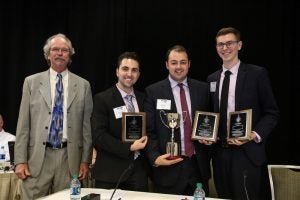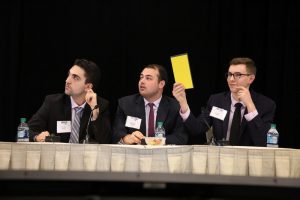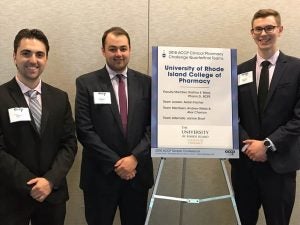Team wins College’s first championship in ACCP Clinical Pharmacy Challenge
 Which anti-coagulation medication must a pharmacist keep sealed in its original packaging until dispensing?
Which anti-coagulation medication must a pharmacist keep sealed in its original packaging until dispensing?
URI College of Pharmacy student Aidan Fischer immediately rang in with the correct answer before the multiple-choice answers were even displayed, setting the tone for the three-member URI team that captured the College’s first championship in the Clinical Pharmacy Challenge Oct. 22. The team outlasted 116 other pharmacy schools from across the country to win the national competition presented by the American College of Clinical Pharmacy (ACCP) at its Annual Meeting in Seattle.
“That was the first question in the lightning round of the finals,” said Fischer, a P4 student from Salem, NH, set to graduate in May. “I knew it was Pradaxa right away and I buzzed in in like two seconds. I think that kind of got in the heads of our opponent. It really set a great tone.”
Fischer and fellow sixth-year students Andrew Webb and Alex Chernov seized the momentum against an undermanned team from the Medical University of South Carolina to dominate the final round on their way to a 2,140-635 victory to secure the “quiz bowl” type competition. Through three rounds of questions in the final — trivia/lightning round, clinical case studies, and a Jeopardy-style contest — the URI team routinely answered ahead of its competitors, building a big enough lead that it coasted to victory without needing to answer a question in the Jeopardy portion.
 “When we realized we couldn’t lose, that was a magical moment,” said Chernoff, a native of West Warwick, R.I. “It was nice to sit back and enjoy the hard work we put into it.”The trio, along with team alternate Janine Short and with the help of coach and Pharmacy Professor Kristina Ward, pored through pharmaceutical journals, ACCP materials and their own text books to brush up on as much information as they could in the weeks leading up to the contest, which includes questions spanning 22 pharmaceutical topics.
“When we realized we couldn’t lose, that was a magical moment,” said Chernoff, a native of West Warwick, R.I. “It was nice to sit back and enjoy the hard work we put into it.”The trio, along with team alternate Janine Short and with the help of coach and Pharmacy Professor Kristina Ward, pored through pharmaceutical journals, ACCP materials and their own text books to brush up on as much information as they could in the weeks leading up to the contest, which includes questions spanning 22 pharmaceutical topics.
“I have to give them all the credit. They went above and beyond,” Ward said. “They were studying an immense amount of information, and even listening to pharmaceutical podcasts in their cars. They were good students to begin with, and then they just kept pouring it on. They were able to compete at the national level with some of the brightest minds in the country. We’re really proud of them.”
 The team found the time to prepare for the competition despite the demands of a challenging class schedule and while performing their professional rotations — Webb at Yale New Haven Hospital, Chernoff and Fischer at the Providence Veterans Affairs Medical Center. The experience gained in those rotations was a key to outlasting so many other schools and winning head-to-head matchups against such schools as Butler University and former winner University of Kentucky.
The team found the time to prepare for the competition despite the demands of a challenging class schedule and while performing their professional rotations — Webb at Yale New Haven Hospital, Chernoff and Fischer at the Providence Veterans Affairs Medical Center. The experience gained in those rotations was a key to outlasting so many other schools and winning head-to-head matchups against such schools as Butler University and former winner University of Kentucky.
“We’re all on different rotations. Being able to use the knowledge we’ve gained on rotations, that personal experience, really helped,” said Webb, a Wyoming, R.I. native. “The exposure we have to the pharmacy experts at URI is invaluable. It really helps to be able to tap into the knowledge they have.”
The URI team made it to the top eight in the 2016 competition, but this is the first championship for the Rhode Island squad.
